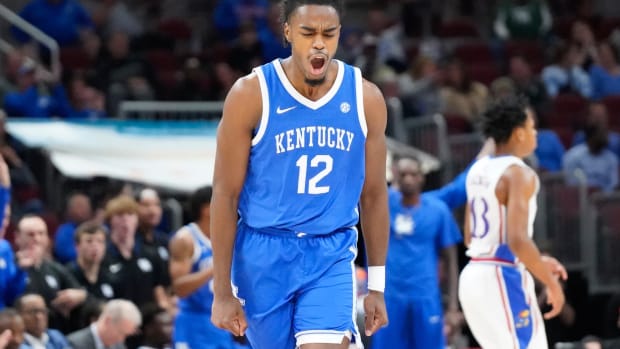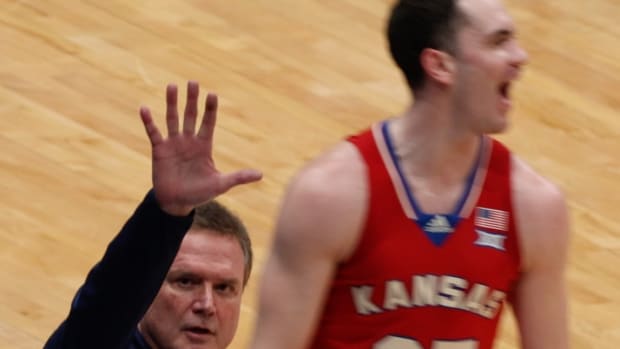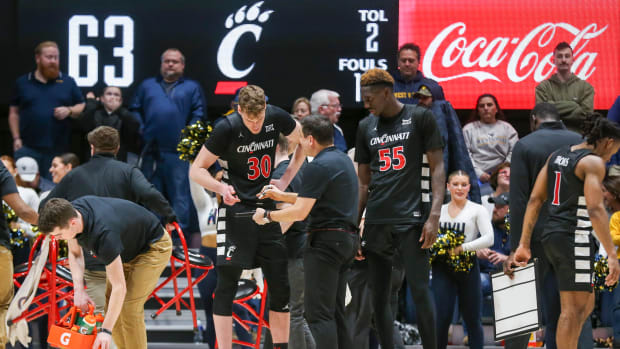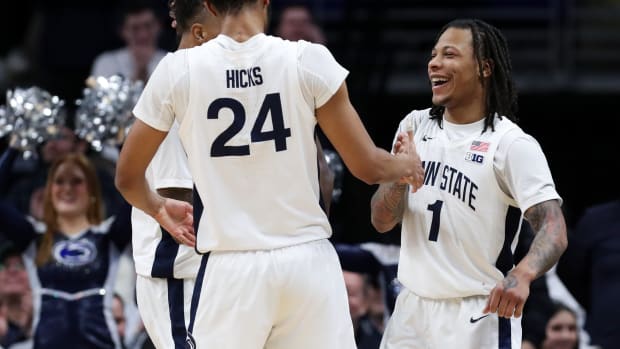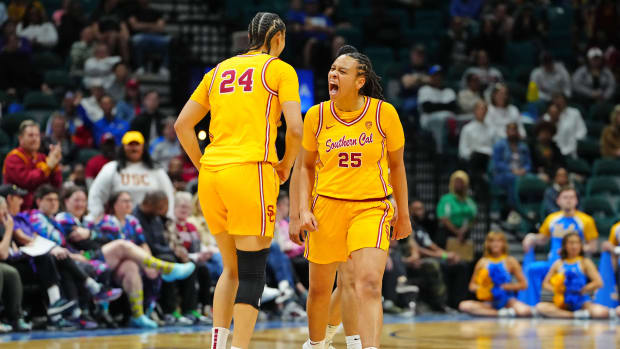Geno Auriemma Reflects on Diana Taurasi's Career, Legacy in Basketball
When researching and exploring the Sports Illustrated Vault in search of information on Diana Taurasi for this week's The Record podcast, it was hard not to come across another figure in women's basketball. UConn coach Geno Auriemma has been a part of Taurasi's life even before she decided to move across the country from California to Connecticut to play college basketball. SI caught up with the Hall of Fame coach to talk about Taurasi's legacy in the sport, the comparisons to Michael Jordan and much more.
The following interview has been lightly edited for clarity and length.
Jamie Lisanti: In 2003, Frank Deford wrote a story in Sports Illustrated about Diana Taurasi and it was right when you were recruiting her. The story was really about your relationship and connection, a lot of which was rooted in your Italian heritage. What do you remember about recruiting her almost 20 years ago? How did you convince her that UConn was the place for her?
Geno Auriemma: It just happened to be that there was a phase that I was going through where I was really starting to understand Italian wines and where they come from and why I like them and what appealed to me. And it dawned on me when I started to learn more about wine, and I said wait a minute, there's a great southern Italian wine called Taurasi. And I said, I don't know what this means but there's an old story that when you came over from Italy, back, back, back, back, if you didn't have all your documentation or whatever, if somebody was pissed when you came, they would just ask what town you were from and that became your last name. So I remember saying to her, Hey, do you know what you know what town your father was born in in Italy? And she goes, No, I have no idea. I said, Well, why don't you find out for me? thinking that they were from the town of Taurasi, which is the name of the wine, which happens to be about 45 minutes from where I was born. So, one thing led to another and to another, and it turns out that there was some truth to that. And that's kind of how it all evolved. And we kind of built the connection, she and I, in talking about her dad and talking about her growing up.
I know what kind of life she had lived up until her senior year in high school. And it was very similar to mine, growing up in a world that your parents had no idea what you were doing all the time or what it meant, you kind of were very independent, you got to do your own thing, live your own life. So that kind of became a big part of the recruiting process was me getting to know her and letting her know that, I kind of lived her life already and that became a real bond, a real connection between the two of us. And it carried over when Chris Dailey and I visited her home, it just kind of cemented the relationship.
JL: One of the things you told her was basically that she was full of it. That you knew that she missed the structure and discipline and you knew that she could get that at UConn.
GA: To me, watching great, great, great players or people with phenomenal talent, phenomenal ability, the thing that gets them in the most trouble is being undisciplined. Being able to do whatever they want, whenever they want, however they feel like doing it, without very many constraints. And I thought to myself, this is who she is. She plays the game with a certain abandon, there's a certain freedom to the way she plays. And that's obviously her personality, so she's living her personality on the court. And I tried to convince her that without some kind of structure, without some kind of discipline to that, and combining that kind of mindset with that discipline that it takes to know when to, and when not to, that she wasn't going to get that at very many places where she was considering going to school. And that they were going to be intimidated by her talent.
I said, look, my biggest fear is that you're going to go wherever you go. And it's going to be exactly like it is right now for you. You kind of are in control of the situation. And, I think deep down inside, I think you don't want that. I think you're craving a little more than that. And that became, from a basketball standpoint, that's where I can help you.
JL: Kelli Anderson's story from 2011 was called The Trials of Diana Taurasi, and it was about the kind of series of unfortunate events that she went through: the DUI arrest, then the murder of her coach in Russia, then erroneous positive drug test after that. And the whole story is really about how she developed this new perspective on basketball. Did you speak with her during those times, during that 2009-11 period when she was going through all that stuff and developing that new perspective on the sport?
GA: I became the national team coach in 2008 to get ready for the world championships in 2010. And even before that, we talked quite a bit, but I got to be more involved as the national team coach. Because obviously, I want to make sure that she's okay. But at the same time, she's the focal point of our team, in so many ways. She always kind of had a little bit of an edge and I do think basketball was too important to her. Some people, they live to play and that's their way of identifying. But Dee, her whole life was wrapped around the game.
If you say, take a day off. No. And even on her days off, she would find a way to get a basketball in her hands. And there was probably never a time when she didn't think about it and she didn't strategize over something or how do I get better or how do we beat this team or how do I beat that guy? So that was her life and after that, some of those things that happened, I think it hardened her a little bit.
She was always like a little bit of a pain in the ass, because she would just do stuff that would make you say, Hey, what are you doing? And she sometimes would have no explanation for it. She just lashed out. And it became more, you saw some of the things that she did with officials on the floor. And then obviously, the DUI thing and the tragedy in Russia. And I think it hardened her and it really gave her an edge and it made her very skeptical and very bitter and very angry at all her circumstances that were popping up and I don't know for sure what the big picture effect was of all that, but I do know that she became an angry player. That was my interpretation. Almost like, I want to take out all my frustrations on the court. And I can see why. Dee always gives this impression of happy go lucky. But that's sometimes jus the mask of a clown.
JL: I know you talked about this recently a little bit, but what in your mind are the similarities between Diana and Michael Jordan?
GA: The most obvious similarities are their commitment and their drive to win. That every single thing they have to win. And it doesn't matter whether it's a shooting drill, it doesn't matter whether we're playing Ping-Pong in the garage. It doesn't matter. It doesn't matter what it is, I have to beat you and I have to prove that I'm better than you are. And that carried over onto the court. So that burning desire to have to win. And that drive to get better, get better and get better. And then being able to pull it off. Having the ball in your hands at crunch time. And being able to pull that off, you know, being able to go on a five-minute stretch where you just dominated the game against the best players in the world. Because why? Because you can and because you have to. That abrasive kind of personality.
I remember reading about Michael Jordan before the show came out and he said, people are gonna think I'm a jerk. And, you know, some people think of Diana that way. But the similarities kind of end there. When you see the documentary on Michael, you see some of the things that he did to his teammates that may come across as like, I wouldn't want to be that guy's teammate. But yet while they were being his teammate, they love winning. And they love the attention that came from that. And they all got better, obviously.
Diana does the exact same thing, but she does it in a completely different way, where everybody that's ever been on her team would die to be her teammate again because she just does it in a different way. She elevates her teammates. She bestows greatness upon that. She convinces them that they're better than they've ever imagined to be. Even if she don't like you. And that's a real gift. To be able to make someone believe that you think they're the greatest and that they need you and that you're the key to winning championships. And even if beyond that, she thinks you're s***head and would never spend five minutes with you off the court.
JL: How do you think those trials and things that she went through will impact her legacy? Or will they? And what do you think Diana's place is among, the basketball greats, male or female?
GA: You and I both know that when it comes to comparing men and women, it works almost in every sport except basketball. You can look at, tennis and skiing and any individual sport. You can say Annika Sörenstam, she's unbelievable. And nobody would say, yeah, but she's not as good as Tiger [Woods]. They would just appreciate her for her own right. But if you say in basketball, the two best players ever are Michael Jordan and Diana Taurasi, people would automatically lose their mind over that, because how dare you put a woman in a man's world? And elevate her to that level.
But the bottom line is every one of those guys that were on those Olympic teams—and she's been fortunate enough to be on four of them, so the best players in the world that have had access to her over a period of 20 years almost. So in addition to wherever else they've interacted, all those interactions, where she's playing cards or she's interacting with them in the bar or she's with them in the food room or she's at game or at practice where they're coming on. Whatever the case may be, there's not one of those guys that would ever walk away from there saying anything other than: It really doesn't matter because if Diana Taurasi was a man, then it would be easy because she is Michael Jordan. She is that level. And it doesn't matter to us if she's a woman. Doesn't matter that she plays in the WNBA. Those guys, whoever they are, going back to 2004 in in Athens all the way through to Rio, will tell you that there's nobody that they respect more.
JL: Diana mentioned recently that she has ambitions of owning a WNBA team after her retirement. What are your thoughts on those ambitions?
GA: I can't imagine there being a time the rest of her life when she's not competing. Like Larry Bird and Michael Jordan and Magic Johnson, those guys can't stop competing. So how do they compete? They compete in a different way. Before I needed to compete and beat you to win the championship. And I could do it on the court. Diana talks about the possibility of ownership, because that's another way to compete. That's another way for to win. That's another way for me to show you that I'm better than you. And maybe not even that. Maybe it's not even to show you that I'm better than you. Maybe it's just because I want to keep challenging myself. I'm not finished yet. I'm not finished challenging myself. I'm not finished trying to find out how many more things can I succeed at? That's not going away.

